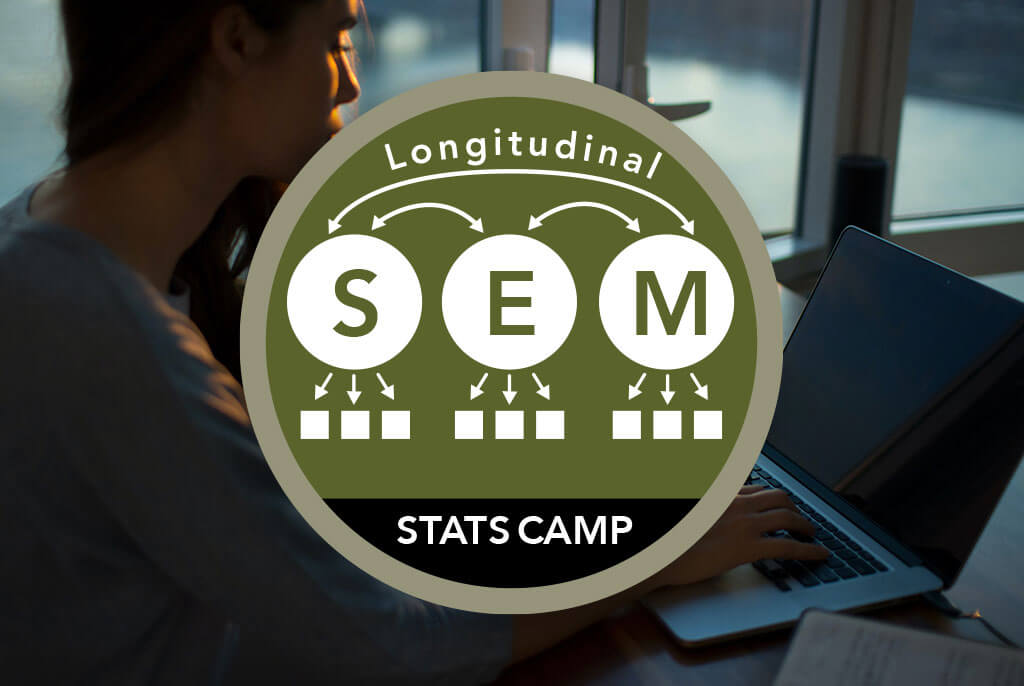 THIS COURSE IS CURRENTLY IN SESSION
THIS COURSE IS CURRENTLY IN SESSION 
IF YOU PURCHASE NOW YOU GET INSTANT ACCESS TO THE REMAINING LIVE INSTRUCTION AS WELL AS THE ASYNCHRONOUS VIDEO TO REVIEW ON YOUR OWN FOR 1 FULL YEAR.
NEXT LIVESTREAM LSEM COURSE STARTS – FEBRUARY 17 – 20, 2023 – ENROLL NOW, CLICK HERE
LIVE STREAM – 4-day Statistics Short Course
Seminar Overview:
This camp is an advanced intensive short seminar in the analysis of longitudinal data using SEM. The seminar will be a series of lectures and computer workshops to provide participants with advanced training in the use of SEM for the analysis of longitudinal data.
Seminar Topics:
- Design and measurement issues in cross-sectional and longitudinal research
- Traditional panel designs
- Overview of missing data
- Latent growth curve modeling
- Testing for Mediation and Moderation
- Multilevel and multiple group SEM
- Using Phantom Constructs
- Multiple group modeling
Seminar Description:
The seminar will be a series of lectures and computer workshops to provide participants with advanced training in the use of SEM for the analysis of longitudinal data.
Instructor: Todd D. Little, Ph.D.

Todd D. Little, Ph.D. is a Professor of Educational Psychology at Texas Tech University (TTU). Little is internationally recognized for his quantitative work on various aspects of applied SEM (e.g., indicator selection, parceling, modeling developmental processes) as well as his substantive developmental research (e.g., action-control processes and motivation, coping, and self-regulation). Prior to joining TTU, … Little has guided quantitative training and provided consultation to students, staff, and faculty at the Max Planck Institute for Human Development’s Center for Lifespan Studies (1991-1998), Yale University’s Department of Psychology (1998-2002), and researchers at KU (2002-2013, including as director of the RDA unit at the Lifespan Institute and as director of the Center for Research Methods and Data Analysis). In 2001, Little was elected to membership in the Society for Multivariate Experimental Psychology, a restricted-membership society of quantitative specialists in the behavioral and social sciences.
In 2009, he was elected President of APA’s Division 5 (Evaluation, Measurement, and Statistics). He founded, organizes, and teaches in the internationally renowned ‘Stats Camps’ each June (see statscamp.org for details of the summer training programs) and has given over 150 workshops and talks on methodology topics around the world. As an interdisciplinary-oriented collaborator, Little has published with over 280 persons from around the world in over 65 different peer-reviewed journals. His work has garnered over 11,000 citations. He published Longitudinal Structural Equation Modeling in 2013 and he has edited five books related to methodology, including the Oxford Handbook of Quantitative Methods and the Guildford Handbook of Developmental Research Methods (with Brett Laursen and Noel Card). Little has served on numerous grant review panels for federal agencies such as NSF, NIH, and IES, and private foundations such as the Jacobs Foundation. He has been the principal investigator or co-principal investigator on over 15 grants and contracts and he has served as a statistical consultant on over 70 grants and contracts. In the conduct of his collaborative research, he has participated in the development of over 12 different measurement tools, including the CAMI, the Multi-CAM, the BALES, the BISC, the I FEEL, and the form/function decomposition of aggression.
Instructor: Whitney Moore, Ph.D.

Dr. Whitney Moore is an Assistant Professor of Kinesiology at East Carolina University. Whitney received her Ph.D. in the Psychosocial Aspects of Health and Physical Activity from the University of Kansas. She has been a Stats Camp instructor since 2012 (after experience being a “counselor” for SEM, Longitudinal SEM, and MLM). Whitney has taught graduate courses in research design, introduction to statistics, ANOVA, SEM, and measurement development at two different R1 institutions. Her research is at the intersection of advanced quantitative methods and psychosocial aspects applied to sport, exercise, and physical education contexts. This is particularly illustrated in her work on measurement development; helping to develop or modify 12 measures in the last 10 years. Whitney is particularly interested in planned missing data designs, finite mixture modeling, plus mediation and moderation in SEM.
APA Continuing Education Credits:
This course offers ? hours of Continuing Education Credits. Yhat Enterprises, LLC is approved by the American Psychological Association to sponsor continuing education for psychologists. Yhat Enterprises, LLC maintains responsibility for this program and its content.
Seminar Includes:
Materials, downloads, recorded course video viewable for up to one year.



